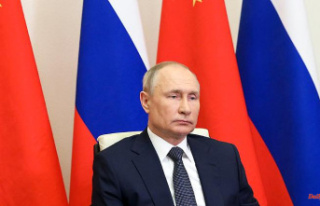After more than three months, Moscow fails to subdue the Ukrainians. However, given the capture of important cities in the Donbass, a Kremlin spokesman can announce that "certain" goals and results will be achieved.
100 days after the start of the Russian offensive in Ukraine, the Kremlin considers "certain" goals to have been achieved. Kremlin spokesman Dmitry Peskov told journalists that Russia had "liberated numerous places" from "armed, pro-Nazi Ukrainian forces" and "nationalist elements". This enabled the population to return to a "life in peace". Peskow added: "This effort will continue until all goals of the military special operation are fulfilled."
Russia launched its far-reaching offensive against Ukraine on February 24, citing protection of the Russian-speaking population in Donbass from an alleged "genocide". Part of the region in eastern Ukraine has been controlled by pro-Russian separatists since 2014.
According to Moscow, it is also about "denazifying" the Ukrainian leadership. Kiev's pro-Western policies have been viewed as a threat in Russia for years. The initial Russian attack on the Ukrainian capital of Kyiv failed. Russian forces are now concentrating on the Donbass in eastern Ukraine, where fierce fighting has been going on for weeks and the Russians are struggling to make military advances. Referring to the population of Donbass, Peskov said on Friday: "Regarding security, measures are being taken, certain results have been achieved".
But Ukrainian President Volodymyr Zelenskyy said that Russia would not prevail: "Our team is much larger. The Ukrainian armed forces are here. The most important thing - the people, our citizens are here. They have been defending Ukraine for 100 days," Zelenskyy said in a video. It shows Selensky with Prime Minister Denys Shmygal and other close government officials in front of the presidential administration in Kyiv and commemorates a message the government recorded immediately after the war began to demonstrate that it would remain in the country to defend it. Prime Minister Shmygal declared that a hundred days after the start of the war Ukraine was "going towards the European family", while Russia was moving towards "a life behind the 'iron curtain' and in isolation from the developed world".
Even on the 100th day of the war, Ukraine is bracing itself against the onslaught of the Russian military. The focus of the fighting was still on the battle for Sievjerodonetsk. The governor of the Luhansk region, Serhiy Gaidai, said he had to admit that the Russian army had managed to penetrate deep into the strategically important industrial city in eastern Ukraine. "She controls most of the city." However, about a fifth is a contested "grey area" in which the Ukrainian fighters persevered and were able to drive Russians out of some streets.
"So I would advise skeptics not to write off Sieverodonetsk. It's too early for that. The city is holding its ground." At the beginning of the invasion, many experts reckoned that Ukraine would be defeated within a few days. However, the Russian military suffered a number of severe setbacks relatively quickly. In March, for example, the Ukrainians defeated Russia at the gates of the capital Kyiv, and later succeeded in doing so in Kharkiv, the second largest city. Russia finally shifted to the east of the country, where it was able to gain more and more ground despite heavy losses. Overall, Russia now controls about a fifth of Ukraine.












